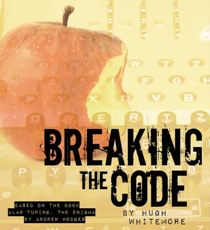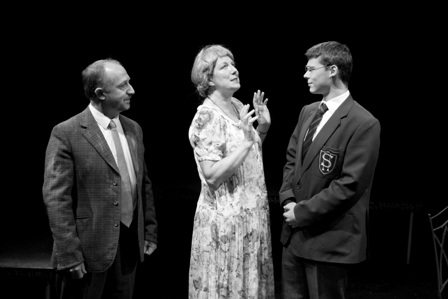The Bench Production

This play was staged at Havant Arts Centre, East Street Havant - Bench Theatre's home since 1977.
Cast
| Alan Turing | Jonathan Abbott |
| Mick Ross | Pete Woodward |
| Sara Turing | Sally Hartley |
| Ron Miller | Chris Vanstone |
| Dillwyn Knox | Terry Smyth |
| Pat Green | Claire Lyne |
| John Smith | Alan Welton |
| Christopher Morcom | Peter Ashdown |
| Nikos | Peter Ashdown |
Crew
| Director | Alan Ward |
| Producers | Alan and Marion Ward |
| Stage Manager | Marion Ward |
| Assistant Stage Manager | Phillippa Thorne |
| Lighting Design | Phil Hanley |
| Sound Design | Jacquie Penrose |
| Lighting Operation | Phil Hanley |
| Sound Operation | Phil Hanley |
| Set Design | David Penrose and Pete Woodward |
| Costumes | Judith Smyth |
| Programme | Derek Callam |
| Front of House | Megan Green |
| Photography | Dan Finch |
Director's Notes
When I start thinking about the next play I would like to direct, I normally begin with productions I have seen in the past, be they professional or amateur, plays I may have appeared in myself some while ago, or just scanning through my home library of plays. However, on this occasion it has been a completely new approach. Marion, my wife and incredibly efficient stage manager, encouraged me to seek out and direct a play I had never been in, seen or read. The idea grew on me and before I knew it I was looking for something fresh to inspire me.
It was about then I also started thinking about the playwright Hugh Whitemore and how much I had become a fan of his writing, especially after seeing productions such as 'The Last Cigarette' and 'A Marvellous Year For Plums' at the Chichester Festival Theatre. Looking at the list of his plays, I first came across 'Pack of Lies' but realised I had already seen that sometime in the early eighties, so that didn't fit in with my search. Then, there it was - 'Breaking the Code - the Alan Turing Story'. As a lover of biopics and true stories it was screaming at me. So I purchased it, read it, was enthralled by it, pitched it to the membership, gathered a talented, enthusiastic cast with a hard-working, committed crew and here we are a year down the line with it in production!
In the last year I have done a lot of research and reading about Turing, his time at Bletchley Park and his work on the Enigma machine. I went to see the film about Turing - 'The Imitation Game' - and as much as I enjoyed it, the thing I admire most about this play is the way it delves a lot deeper into Turing's private life. In my opinion, Whitemore successfully delivers an accurate reflection of the narrow-minded attitudes of the post WW2 era and captures the catastrophic effect it had on a truly brilliant man.
I sincerely hope you leave the theatre tonight not only entertained but well informed and with a greater understanding of the whole Turing legacy.
Alan Ward
Reviews
The NewsJames George
The Bench's topical choice for its latest stint at The Spring is Hugh Whitemore's Breaking The Code - the story of Alan Turing, his homosexuality and his contribution to Bletchley Park and artificial intelligence.
Playing on a pared-down set - three tables set on three levels - the play looks a treat.
Much good work comes from the supporting players, here, with Chris Vanstone and Alan Welton giving the most realistic performances among the men and Sally Hartley as Turing's mother striking a lovely balance between mayhem and misery.
The central performance from Bench newcomer - and relative newcomer to acting - Jonathan Abbott is clearly worth admiration. Turing is rarely off the stage and Abbott is confident with the dialogue and does a very convincing stammer, but this Turing is a humourless creation that would benefit from a more creative approach to the man's thought processes.
James George, The News, 19th September 2015
RemotegoatJill Lawrie
Hugh Whitemore's best known work "Breaking the Code" was first performed in 1986 and subsequently played on Broadway the following year. His plays often centre on historical figures and this is no exception focusing on the eccentric genius Alan Turing and based on the book by mathematician Andrew Hodges - "Alan Turing, the Enigma".
In the 80's Derek Jacobi was outstanding as Alan Turing starring in both the West End and on Broadway, and last years hugely successful film "The Imitation Game" saw Benedict Cumberbatch as the pioneering logician, picking up an Oscar for Best Adapted Screenplay.
Alan Mathison Turing was a ground-breaking mathematical biologist and his Turing machine led to the development of the computer. During the Second World War, while working at Bletchley Park, he played a pivotal role in cracking the Nazi's Enigma Code and thus shortened the war and saved many many lives. But in post war Britain he had the misfortune to fall victim to cruel narrow-minded stuffiness and homophobia and was convicted of gross indecency which led ultimately to him taking his own life.
This honest and compassionate drama is both intellectually and physically challenging for Director Alan Ward but despite the obvious space restrictions, the staging adapted to portray 8 different locations and the talented cast coped well with the scientific demands of this biographical piece.
There was strong support from some of the minor characters namely Peter Woodward playing the Detective Sergeant Mick Ross and Chris Vanstone (Ron Miller) the young man whom Turing had an affair with. Newcomer Peter Ashdown, initially played Christopher Morcom, Alan's first school crush and then impressed as the Greek Nikos. Claire Lyne gave a warm sensitive performance as Turing's Bletchley colleague Pat Green, a brilliant mathematician whose unrequited love for him went virtually unnoticed. Sally Hartley (Turing's mother) grew into her role and improved as the story unfolded and she finally emotionally connected with her son.
However the play belonged to Jonathan Abbott for his heroic marathon, on stage throughout - a remarkable emotional achievement. Making his debut with Bench Theatre he was in character from the outset - awkward, anti social and with a nervous stammer, yet passionate in his delivery of analogies, ciphers, codes and scientific problems, keenly explaining that the brain is like grey porridge and a fir cone mimics the Fibonacci sequence of numbering!
The play with its long analytical monologues, was slightly too long at two and half hours with a consequent lack of energy at times, but overall this powerful theatrical work was brought to life and highlighted the brutal, inhuman drug treatment forced on Turing to keep him out of jail. A predicament he was finally unable to bear.
Remotegoat, Jill Lawrie, September 2015
Production Photographs
